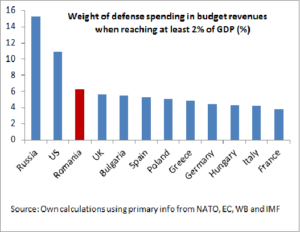I recently attended a security lecture held by a retired general where I learnt a new term: “non-kinetic warfare”. You may probably not be familiar with it either as I found that a google search for the Romanian term gave almost no results. It defines the type of warfare waged against a country unlike the conventional attacks that involve military equipment on a battlefield: tanks, aircraft, ships, missiles, infantry and so on. It is a kind of war which more and more countries are subject to and which is fought in unorthodox ways.
A list which is by no means complete includes among these forms of warfare: generating fake news, cyberattacks, funding certain political movements, fostering mistrust in leaders and alliances, radicalization and polarization of societies to render them weaker and so on. Non-kinetic warfare caught NATO countries unawares and it is only now that they are starting to implement coordinated counterattack strategies. The outcomes have yet to be convincing.
Romania, too, has become part of this coordinated action. Whether we talk about cybersecurity centres which also deal with Ukraine`s cybersecurity at NATO`s request, or about setting up the Informational War Analysis and Strategic Communication Laboratory (LARICS), to mention just two projects, the basic objective is the same: neutralizing non-kinetic warfare. Similar steps have been taken by other European states, as Romania is by far no exception.
 And yet there is a side of the matter that singles Romania out and presents those willing to wage a non-kinetic war against it with a unique opportunity. The vulnerability is all the more relevant as Romania is a border country and as such massively exposed geopolitically. The dream of any regional power is having weak, easy to invade countries at the border. History has shown that in other instances also involving border countries, such a goal is easily attainable by encouraging mistrust, division and a general sense of frustration by questioning the liberal government system.
And yet there is a side of the matter that singles Romania out and presents those willing to wage a non-kinetic war against it with a unique opportunity. The vulnerability is all the more relevant as Romania is a border country and as such massively exposed geopolitically. The dream of any regional power is having weak, easy to invade countries at the border. History has shown that in other instances also involving border countries, such a goal is easily attainable by encouraging mistrust, division and a general sense of frustration by questioning the liberal government system.
In Romania`s case, though, it`s a buy one, get one free promotion. The bargain is that they get the chance to erode the foundation of economic growth by fostering and fueling a sentiment firmly embedded into the society: a sentiment of deep mistrust in how taxpayers` money is being handled which resulted in years of permanent pressure on decreasing the government budget as a percentage of GDP (Gross Domestic Product), thus downsizing its economy.
Driving people to wish for higher education and healthcare spending to get to the “European level” as a percentage of GDP while calling for tax cuts, is a sure recipe for collective frustrations which are only meant to weaken a country. The illusion of a utopian state with generous government spending and puny revenues is extremely appealing, despite it making no economic sense. And it`s exactly due to its appeal that the political parties have been rushing in the past decade to oblige.
A perfect weapon for the non-kinetic warfare today which will only have to maintain the illusion in order to work. Bit by bit the economic cracks are growing, and the economic failure will serve beautifully the initial purpose: cessation of public investments, keeping the…eastern part of the country underdeveloped (thus making sure it is easy to invade), a terrible sense of public frustration through underfunded health and education services, loss of trust in the country`s leaders, encouraging youth indifference and eventual emigration. A border country with such deficiencies is a sitting duck, all the more so since the development gaps between the historical regional are growing.
Wrong, some will say. How can we be a victim when our defense spending has just been increased to 2% of GDP? The question that the military should ask themselves is “for how long?”. A country that instead of growing in a balanced and sustained manner is following the voice of seen or unseen mermaids telling it to decrease its budget revenue cannot support that defense budget in the long term. The irony is that keeping it at 2% could suit the aggressor country`s purpose beautifully.
 Having a defense budget to European standards and healthcare and education budgets to African standards will be a sure way to turn the army into a caste in the public mind. As far as the non-kinetic warfare is concerned, such a fault line between the military and the population would fit the purpose, and the longer this major split is maintained, the better. The army enjoys after all the highest level of confidence and all that chipping away at the base of confidence by allocating the highest budget appropriation to defense does is to erode public sympathy over time as shortages in other areas continue.
Having a defense budget to European standards and healthcare and education budgets to African standards will be a sure way to turn the army into a caste in the public mind. As far as the non-kinetic warfare is concerned, such a fault line between the military and the population would fit the purpose, and the longer this major split is maintained, the better. The army enjoys after all the highest level of confidence and all that chipping away at the base of confidence by allocating the highest budget appropriation to defense does is to erode public sympathy over time as shortages in other areas continue.
There are also those opinions purporting that Romania is not in fact in an abnormal situation. Developed European countries, at the start of their growth, also reported low budget revenues as a percentage of GDP, which increased as the country developed economically and institutionally. In other words, the revenue collection rate can be improved only given time, once higher growth levels are reached.
Indeed, if we look at the last 50 years we notice that many Western European countries had a tax revenue rate of around 30% to start off to currently reach 43-50%. The problem is not just that Romania, 25 years on, is failing to get past the 30% threshold, but that the scheduled tax policies do not give us any reason to hope, suggesting that there is something fundamentally wrong.
The problem does not lie in the degree of economic development, as pertinently explained by the chair of the Budgetary Council: “Had Romania had the same revenue as a percentage of GDP as Bulgaria, it would be reporting a surplus”.
At the end of the presentation I dared and asked the general a question. “Don`t you think that the tiny Romanian budget is a matter of national security?”
“I`m sorry I know nothing about economics”, he replied.
Have a nice weekend!
Subscribe to receive notifications when new articles are published
